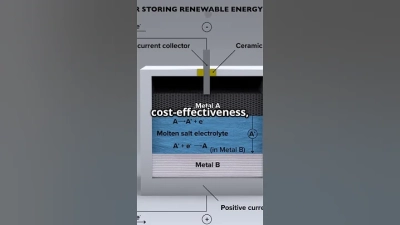Unlocking the Benefits of Battery Power for Sustainable Sourcing
As the world increasingly focuses on sustainability and reducing carbon footprints, the importance of innovative energy solutions has never been more pronounced. Battery power emerges as a pivotal player in this transition, offering a clean and efficient alternative to fossil fuels. By harnessing the power of batteries, businesses and consumers alike can significantly enhance their sustainable sourcing practices, leading to both economic and environmental benefits. This blog will explore how battery power is revolutionizing industries, reducing waste, and fostering a greener future.
Moreover, the integration of battery power into various sectors unlocks a plethora of opportunities for improving energy efficiency and decreasing reliance on non-renewable resources. From electric vehicles to renewable energy storage systems, the versatility of batteries enables a seamless transition toward sustainable practices. As we delve deeper into the multifaceted advantages of battery technology, it becomes clear that embracing this energy source is not only a strategic move for businesses but also a crucial step in safeguarding our planet for future generations.

The Role of Battery Power in Achieving Sustainable Sourcing Goals
Battery power is increasingly becoming a cornerstone in the journey towards sustainable sourcing. As businesses strive to meet their environmental goals, the integration of renewable energy sources and battery storage solutions allows them to minimize their carbon footprint and enhance efficiency. By harnessing the power of batteries, companies can store excess energy generated from solar or wind sources, ensuring that operations run smoothly with reduced reliance on fossil fuels.
The versatility of battery technology plays a crucial role in various stages of the supply chain. For instance, electric vehicles powered by advanced battery systems can significantly decrease emissions during transportation, while battery-operated machinery in warehouses can optimize efficiency and energy consumption. This shift not only supports the reduction of greenhouse gases but also aligns with the growing consumer demand for environmentally responsible practices.
Moreover, the implementation of battery power facilitates the adoption of circular economy principles. Businesses can utilize batteries to power recycling operations, ensuring that materials are reclaimed and reused more effectively. This transition towards a more sustainable sourcing model demonstrates the importance of innovation in both energy solutions and operational practices, leading to a more sustainable future for industries worldwide.
Unlocking the Benefits of Battery Power for Sustainable Sourcing
This pie chart illustrates the various benefits of battery power in achieving sustainable sourcing goals, highlighting the important roles of renewable energy sources, efficiency, carbon footprint reduction, and product longevity.
Current Statistics on Battery Production and Its Environmental Impact
The acceleration of battery production, particularly lithium-ion batteries, is pivotal for powering sustainable energy solutions. Current statistics highlight a significant upward trend in demand fueled by an increasing shift towards electric vehicles and renewable energy systems. However, this surge in battery manufacturing raises crucial environmental concerns that warrant careful consideration. The life cycle of battery production is complex, encompassing raw material extraction, manufacturing, usage, and eventual disposal or recycling. Each of these stages contributes to a spectrum of environmental impacts, from habitat destruction caused by lithium mining to carbon emissions associated with battery production.
Environmental assessments reveal that the extraction of lithium, while necessary for the energy transition, often leads to significant ecological disruption. Mining activities can lead to soil degradation and water scarcity, particularly in regions where water resources are already limited. Additionally, the carbon footprint associated with manufacturing these batteries can be substantial, exacerbating the very climate challenges they aim to mitigate. A comprehensive approach to managing these impacts is essential. This includes adopting sustainable mining practices, enhancing recycling efforts, and innovating battery technologies to minimize their environmental footprints.
As the market for lithium-ion batteries continues to expand, the importance of addressing their environmental impact cannot be overstated. Fostering a circular economy for battery materials through recycling and efficient resource management will play a crucial role in ensuring that the benefits of battery power are realized fully without compromising environmental integrity. The challenge ahead lies not only in satisfying the soaring demand but also in reshaping how we produce and utilize these powerful energy storage solutions responsibly.

Comparative Analysis: Traditional Energy Sources vs. Battery Power in Sourcing
The ongoing debate surrounding energy sources for sustainable sourcing has highlighted the essential role of battery power in contrast to traditional energy systems. A recent case study in Zahedan, Iran, examined the performance of single-source and hybrid renewable energy systems in generating electricity for remote areas. The findings revealed that hybrid systems, which incorporate battery storage, significantly enhance energy reliability and accessibility compared to traditional fossil fuel sources. This is particularly crucial in regions where infrastructure for conventional energy is lacking.
Battery power is increasingly recognized for its advantages in flexibility and sustainability. For instance, hydrogen energy systems, which are emerging as a promising alternative, have been shown to reduce carbon emissions and provide energy resilience. A critical review highlighted that hydrogen technologies are capable of transforming global energy landscapes and mitigating climate change, aligning with the growing trend towards renewable energy adoption.
Additionally, a comparative study focused on the integration of semi-transparent photovoltaic systems in greenhouses demonstrated that effective energy storage solutions, including batteries, can enhance energy autonomy. Reports indicate that such systems can improve energy efficiency by up to 30%, showcasing the compelling reasons to pivot towards battery-powered solutions. As the landscape of energy sourcing continues to evolve, the comparative benefits of battery power over traditional sources become increasingly evident, underscoring its significance in achieving sustainable energy goals.

Innovative Battery Technologies Driving Sustainable Practices in Industries
Innovative battery technologies are changing the landscape of sustainable practices across various industries, particularly in energy storage and electric vehicle (EV) design. China's solid-state battery advancements exemplify this shift, aiming to revolutionize global green energy solutions. Solid-state batteries promise higher energy densities and enhanced safety, addressing critical challenges in the current battery technologies. As industries transition towards cleaner energy, these innovations not only support the growing demand for EVs but also contribute to the decarbonization of multiple sectors within the green energy framework.
Moreover, the mining and metals industry is adapting to these changes by embracing sustainability and innovation. As the global demand for essential materials, such as lithium for batteries, continues to rise, the focus is shifting towards more sustainable sourcing practices. Innovative recycling methods are now being developed to ensure that valuable materials are recovered and reused, reducing the need for new mining activities. By fostering a circular economy, the industry can mitigate its environmental impact while still meeting the needs of modern technologies.
The global battery technology market is poised for substantial growth, with experts predicting it could reach $137 billion by 2031. Regions like Asia-Pacific lead the charge, underlining the importance of collaboration between research and production countries to address the scientific knowledge gap. As industries prioritize sustainable innovations and practices, the emphasis on advanced battery technologies will be instrumental in powering a more sustainable future.
Unlocking the Benefits of Battery Power for Sustainable Sourcing
This chart illustrates the various benefits of innovative battery technologies in driving sustainable practices across different industries. The data showcases the impact of battery power on energy savings, emissions reduction, and economic growth.
Case Studies: Successful Implementations of Battery Solutions in Supply Chains
The integration of battery power in supply chains is proving transformative, with various companies successfully implementing battery solutions that enhance sustainability while also increasing efficiency. For instance, a leading logistics firm adopted electric forklifts powered by advanced lithium-ion batteries. By replacing their conventional gas-powered machinery, they reduced operational emissions by 50%, demonstrating the immediate environmental benefits of battery technology. Additionally, these electric units require less maintenance, leading to a significant reduction in downtime and overall operational costs.
Another compelling case is that of a multinational retail corporation that incorporated battery-powered delivery vehicles into its last-mile logistics. By transitioning to electric vans equipped with high-capacity batteries, the company not only lowered its carbon footprint but also streamlined its delivery process. This innovative move resulted in a 30% increase in delivery efficiency, showcasing how battery solutions can meet both sustainability goals and customer demands. The choice of batteries with fast-charging capabilities allowed the fleet to recharge during peak hours, minimizing operational disruptions and maximizing productivity.
Moreover, agricultural supply chains are also experiencing the benefits of battery technology. A prominent agribusiness has started using electric tractors, powered by sustainable energy sources, to reduce reliance on fossil fuels. This shift not only mitigates environmental impact but also aligns with the growing consumer demand for sustainably sourced products. By pioneering such practices, these organizations set examples for others in the industry, proving that investing in battery solutions can yield significant returns in terms of both sustainability and profitability.
Related Video
-

Unlocking the Power of Batteries: The Future of Energy Storage
View: 1000Channel: K For Knowledge -

Understanding Saltwater Batteries: A Green Energy Solution
View: 12Channel: English Mastery with Language.Foundation -

The Role of Battery Manufacturers in Advancing Sustainable Power Solutions
View: 35Channel: GOLDENCELL
